60 Days Timetable for "Physics" NEET Preparation | Physics Class 11 PDF Download
The National Eligibility cum Entrance Test (NEET) is a highly competitive medical entrance exam in India. It serves as the gateway for aspiring students to secure admissions into undergraduate medical and dental courses in various colleges across the country. To succeed in NEET, you must master all three subjects: Physics, Chemistry, and Biology.
In this comprehensive study plan, we will focus on NEET Physics preparation. Physics is an integral part of the NEET exam, carrying significant weightage. To excel, you need a well-structured plan that covers all the chapters systematically. Let's dive into the details.
In this 60-day NEET Physics preparation timetable, we'll cover all the Physics chapters systematically. Each chapter will be given two days for comprehensive coverage.
Understanding the NEET Physics Syllabus
The NEET Physics syllabus consists of chapters from both Class 11 and Class 12. We will cover each chapter systematically to ensure thorough preparation.
Now, let's create a comprehensive 60-day study plan to cover all these chapters efficiently.
Day 1-2: Class 11 - Chapter 1: Units and Measurements
Subtopics:
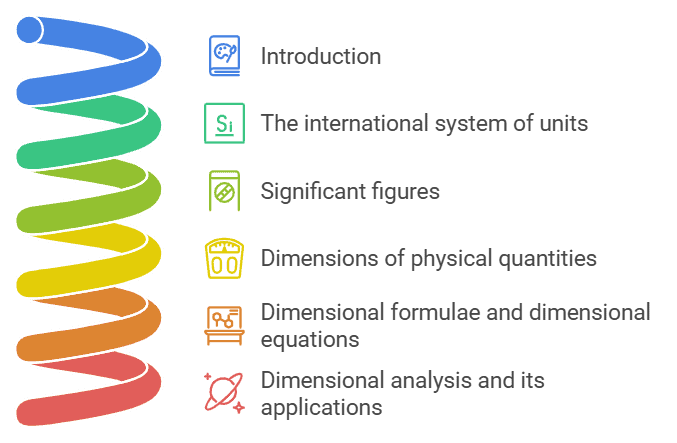
How to Study:
- Start with the introduction and understand the importance of units in physics.
- Learn the international system of units, including fundamental units and derived units.
- Study significant figures and their significance in measurements.
- Understand the concept of dimensions, dimensional formulae, and their applications.
Tips and Tricks:
- Use mindmaps for quick revision. Mindmaps Physics Class 11
- Watch videos to reinforce your understanding.
- Solve practice questions from DPP for NEET Physics Class 11. DPP for NEET Physics Class 11
- Attempt Test: Units & Measurement.
Things to Keep in Mind:
- Revise all the concepts.
- Take a test to assess your knowledge.
Day 3-4: Class 11 - Chapter 2:
Motion in a Straight Line
Subtopics:
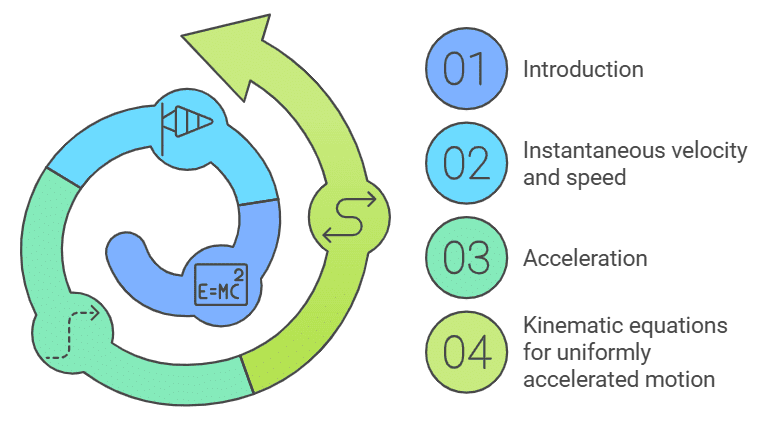
How to Study:
- Begin with an overview of motion in a straight line.
- Learn about instantaneous velocity, speed, and acceleration.
- Master the kinematic equations for uniformly accelerated motion.
Tips and Tricks:
- Use mindmaps for quick revision. Mindmaps Physics Class 11
- Visualize motion with real-life examples.
- Solve numerical problems to strengthen your problem-solving skills.
Things to Keep in Mind:
- Regularly practice numerical problems.
- Take a test to assess your understanding.
- Attempt Test: Motion in a Plane.
Day 5-6: Class 11 - Chapter 3: Motion in a Plane
Subtopics:
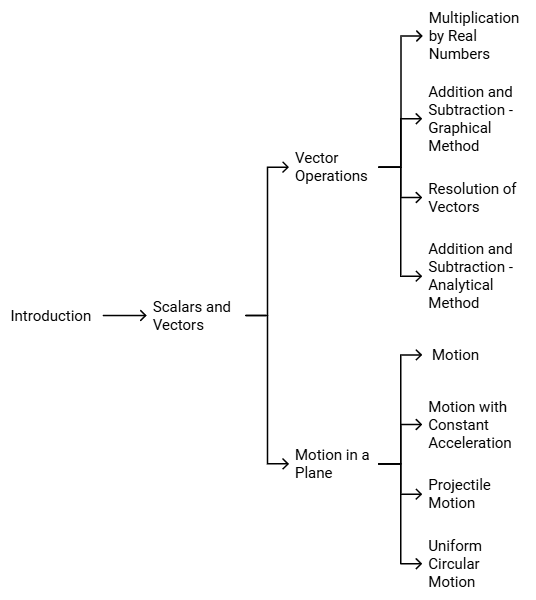
How to Study:
- Start with understanding scalars and vectors.
- Learn vector operations like multiplication, addition, and resolution.
- Study motion in a plane, including constant acceleration, projectile motion, and uniform circular motion.
Tips and Tricks:
- Use mindmaps for quick revision. Mindmaps Physics Class 11
- Practice vector operations with diagrams.
- Solve problems involving motion in a plane.
Things to Keep in Mind:
- Practice vector addition and subtraction.
- Take a test to evaluate your grasp of vector concepts.
- Attempt Test: Motion in a Plane.
Day 7-8: Class 11 - Chapter 4: Laws of Motion
Subtopics:

How to Study:
- Begin with understanding the history of motion laws.
- Learn about the law of inertia and Newton's laws of motion.
- Study concepts like conservation of momentum, equilibrium, and circular motion.
Tips and Tricks:
- Use mindmaps for quick revision. Mindmaps Physics Class 11
- Practice problem-solving for Newton's laws.
- Explore practical applications of these laws.
Things to Keep in Mind:
- Regularly solve problems on Newton's laws.
- Take a test to assess your understanding of mechanics.
- Attempt Test: Laws of Motion.
Day 9-10: Class 11 - Chapter 5: Work, Energy, and Power
Subtopics:
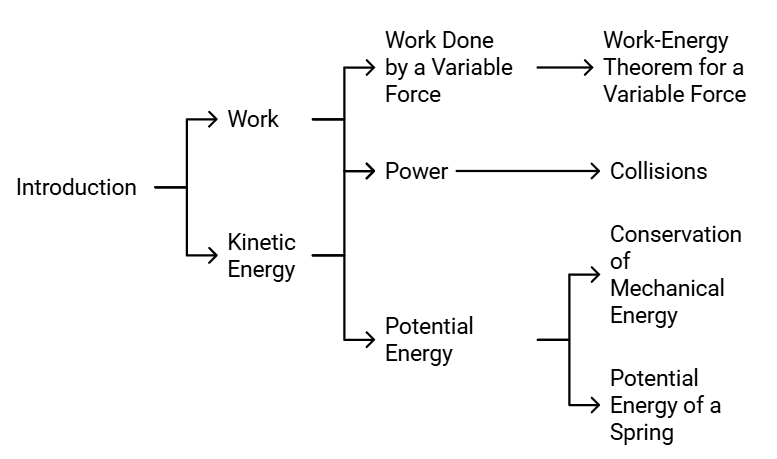
How to Study:
- Start with understanding the concept of work and kinetic energy.
- Learn about the work-energy theorem, potential energy, and power.
- Explore the conservation of mechanical energy and collisions.
Tips and Tricks:
- Use mindmaps for quick revision. Mindmaps Physics Class 11
- Visualize energy transformations in various scenarios.
- Solve problems involving work and energy.
Things to Keep in Mind:
- Practice solving problems related to energy and power.
- Take a test to assess your grasp of these concepts.
- Attempt Test: Work, Energy & Power.
Day 11-12: Class 11 - Chapter 6: System of Particles and Rotational Motion
Subtopics:
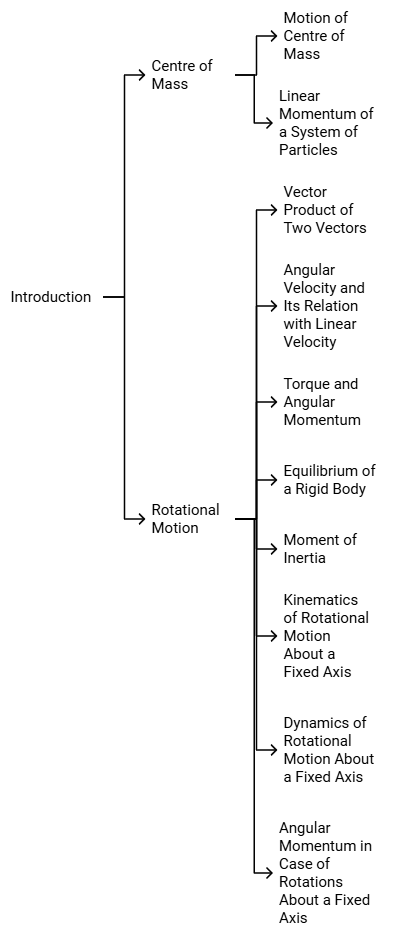
How to Study:
- Begin by understanding the concept of the center of mass.
- Learn about linear momentum, angular velocity, torque, and angular momentum.
- Study the dynamics of rotational motion about a fixed axis.
Tips and Tricks:
- Use mindmaps for quick revision. Mindmaps Physics Class 11
- Visualize the rotation of objects in different scenarios.
- Solve problems related to rotational motion.
Things to Keep in Mind:
- Practice solving problems involving rotational dynamics.
- Take a test to evaluate your understanding of rotational motion.
- Attempt Test: Rotational Motion.
Day 13-14: Class 11 - Chapter 7: Gravitation
Subtopics:
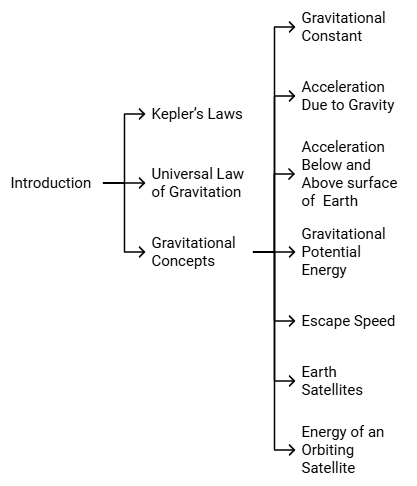
How to Study:
- Begin by understanding the historical context of gravitation.
- Learn Kepler's laws, the universal law of gravitation, and the concept of gravitational constant.
- Study the calculation of acceleration due to gravity and potential energy.
Tips and Tricks:
- Use mindmaps for quick revision. Mindmaps Physics Class 11
- Watch videos explaining celestial mechanics.
- Solve problems related to gravitational forces and orbits.
Things to Keep in Mind:
- Practice calculating escape speed and orbital energy.
- Take a test to assess your understanding of celestial mechanics.
- Attempt Test: Gravitation.
Day 15-16: Class 11 - Chapter 8: Mechanical Properties of Solids
Subtopics:
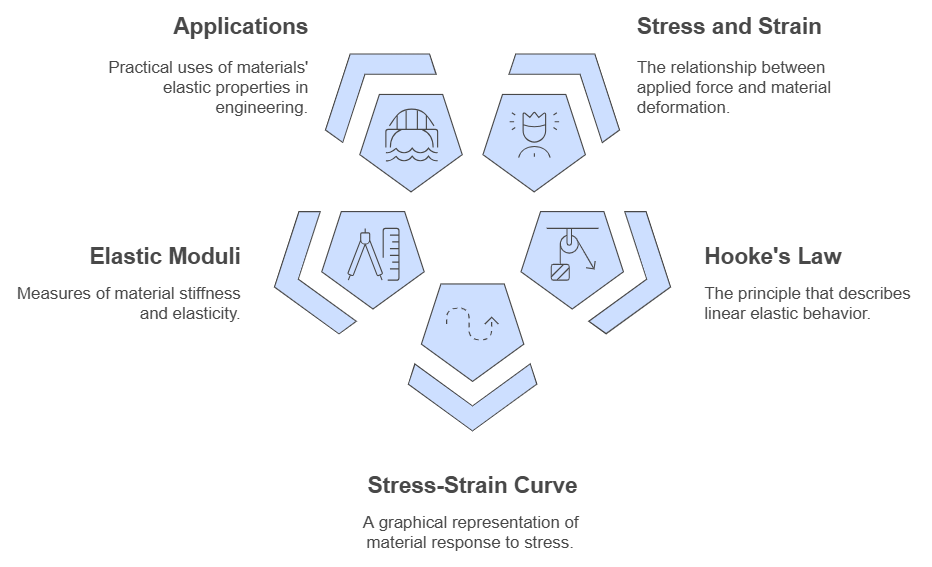
How to Study:
- Begin with understanding stress and strain.
- Learn about Hooke's law and the stress-strain curve.
- Study elastic moduli and their applications in materials.
Tips and Tricks:
- Use mindmaps for quick revision. Mindmaps Physics Class 11
- Conduct practical experiments to understand stress and strain.
- Solve problems related to mechanical properties of solids.
Things to Keep in Mind:
- Practice calculating stress, strain, and moduli in various scenarios.
- Take a test to assess your grasp of material properties.
- Attempt Test: Mechanical Properties of Solids.
Day 17-18: Class 11 - Chapter 9: Mechanical Properties of Fluids
Subtopics:
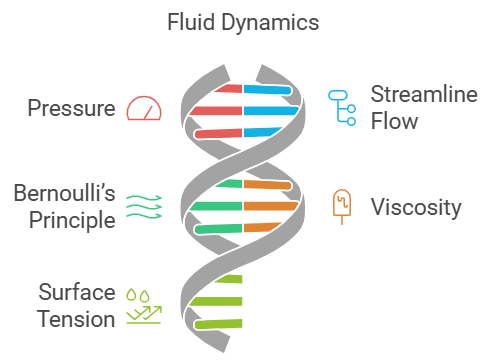
How to Study:
- Start with understanding pressure in fluids.
- Learn about streamline flow, Bernoulli's principle, viscosity, and surface tension.
Tips and Tricks:
- Use mindmaps for quick revision. Mindmaps Physics Class 11
- Conduct simple fluid experiments to observe principles like Bernoulli's.
Things to Keep in Mind:
- Practice solving problems related to fluid mechanics.
- Take a test to assess your understanding of fluid properties.
- Attempt Test: Fluid Mechanics.
Day 19-20: Class 11 - Chapter 10: Thermal Properties of Matter
Subtopics:
- Introduction
- Temperature and heat
- Measurement of temperature
- Ideal-gas equation and absolute temperature
- Thermal expansion
- Specific heat capacity
- Calorimetry
- Change of state
- Heat transfer
- Newton’s law of cooling
How to Study:
- Begin by understanding temperature, heat, and their measurement.
- Learn about ideal-gas equation, thermal expansion, and specific heat capacity.
- Study calorimetry, changes of state, heat transfer, and cooling.
Tips and Tricks:
- Use mindmaps for quick revision. Mindmaps Physics Class 11
- Perform calorimetry experiments to understand heat transfer.
- Solve problems related to thermal properties.
Things to Keep in Mind:
- Practice calculating temperature changes, specific heat, and heat transfer.
- Take a test to assess your understanding of thermal properties.
- Attempt Test: Thermal Expansion.
Day 21-22: Class 11 - Chapter 11: Thermodynamics
Subtopics:
- Introduction
- Thermal equilibrium
- Zeroth law of thermodynamics
- Heat, internal energy and work
- First law of thermodynamics
- Specific heat capacity
- Thermodynamic state variables and equation of state
- Thermodynamic processes
- Second law of thermodynamics
- Reversible and irreversible processes
- Carnot engine
How to Study:
- Start with understanding thermal equilibrium and the zeroth law.
- Learn about heat, internal energy, work, and the first law of thermodynamics.
- Study specific heat capacity, thermodynamic processes, and the second law of thermodynamics.
Tips and Tricks:
- Use mindmaps for quick revision. Mindmaps Physics Class 11
- Visualize thermodynamic processes on pressure-volume graphs.
- Solve problems related to thermodynamics.
- Attempt Test: Thermodynamic Processes.
Things to Keep in Mind:
- Practice solving problems on heat, work, and thermodynamic processes.
- Take a test to assess your understanding of thermodynamics.
Day 23-24: Class 11 - Chapter 12: Kinetic Theory
Subtopics:
- Introduction
- Molecular nature of matter
- Behaviour of gases
- Kinetic theory of an ideal gas
- Law of equipartition of energy
- Specific heat capacity
- Mean free path
How to Study:
- Begin with understanding the molecular nature of matter.
- Learn about the behavior of gases and the kinetic theory of an ideal gas.
- Study the law of equipartition of energy, specific heat capacity, and mean free path.
Tips and Tricks:
- Use mindmaps for quick revision. Mindmaps Physics Class 11
- Explore real-life examples of kinetic theory.
- Solve problems related to gas behavior.
Things to Keep in Mind:
- Practice solving problems involving gas properties and kinetic theory.
- Take a test to assess your understanding of molecular behavior.
- Attempt Test: Kinetic Theory.
Day 25-26: Class 11 - Chapter 13: Oscillations
Subtopics:
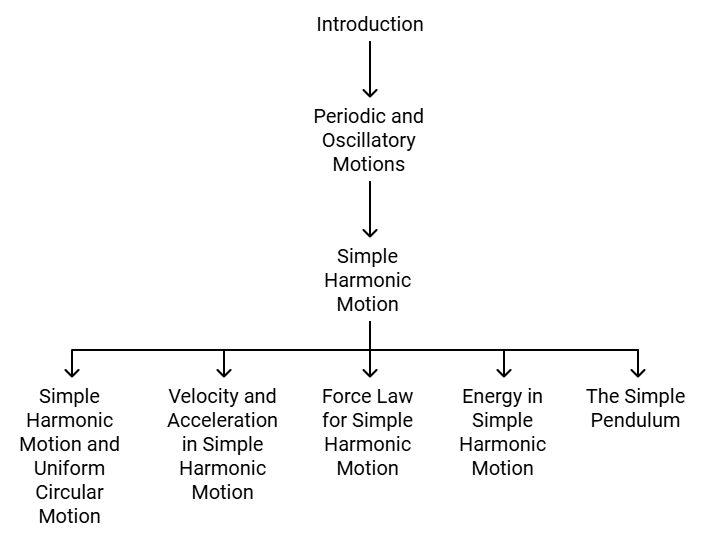
How to Study:
- Start with understanding periodic and oscillatory motions.
- Learn about simple harmonic motion, including its velocity, acceleration, and energy aspects.
- Study the force law for simple harmonic motion and the behavior of a simple pendulum.
Tips and Tricks:
- Use mindmaps for quick revision. Mindmaps Physics Class 11
- Visualize oscillatory motion using diagrams.
- Solve problems related to simple harmonic motion and pendulums.
Things to Keep in Mind:
- Practice calculating properties of simple harmonic motion.
- Take a test to assess your understanding of oscillations.
- Attempt Test: Oscillations.
Day 27-28: Class 11 - Chapter 14: Waves
Subtopics:
- Introduction
- Transverse and longitudinal waves
- Displacement relation in a progressive wave
- The speed of a traveling wave
- The principle of superposition of waves
- Reflection of waves
- Beats
How to Study:
- Begin with an overview of waves and their types.
- Learn about transverse and longitudinal waves.
- Study displacement relations, wave speed, superposition, reflection, and beats.
Tips and Tricks:
- Use mindmaps for quick revision. Mindmaps Physics Class 11
- Observe real-life examples of wave phenomena.
- Solve problems related to wave properties.
Things to Keep in Mind:
- Practice calculating wave properties and solving wave-related problems.
- Take a test to assess your understanding of wave mechanics.
- Attempt Test: Waves.
Day 29-30: Class 12 - Chapter 1: Electric Charges and Fields
Subtopics:
- Introduction
- Electric Charge
- Conductors and Insulators
- Basic Properties of Electric Charge
- Coulomb’s Law
- Forces between Multiple Charges
- Electric Field
- Electric Field Lines
- Electric Flux
- Electric Dipole
- Dipole in a Uniform External Field
- Continuous Charge Distribution
- Gauss’s Law
- Applications of Gauss’s Law
How to Study:
- Begin with understanding electric charge and its properties.
- Learn about conductors, insulators, Coulomb's law, and electric field.
- Study electric field lines, flux, dipoles, and Gauss's law.
Tips and Tricks:
- Use mindmaps for quick revision. Mindmaps Physics Class 12
- Visualize electric field patterns due to different charge configurations.
- Solve problems involving electric charges and fields.
Things to Keep in Mind:
- Practice calculating electric field and electric flux in various scenarios.
- Take a test to assess your understanding of electric charges and fields.
- Attempt Test: Electric Charge.
Day 31-32: Class 12 - Chapter 2: Electrostatic Potential and Capacitance
Subtopics:
- Introduction
- Electrostatic Potential
- Potential due to a Point Charge
- Potential due to an Electric Dipole
- Potential due to a System of Charges
- Equipotential Surfaces
- Potential Energy of a System of Charges
- Potential Energy in an External Field
- Electrostatics of Conductors
- Dielectrics and Polarisation
- Capacitors and Capacitance
- The Parallel Plate Capacitor
- Effect of Dielectric on Capacitance
- Combination of Capacitors
- Energy Stored in a Capacitor
How to Study:
- Begin by understanding electrostatic potential and its relation to point charges.
- Learn about potential due to dipoles, systems of charges, and equipotential surfaces.
- Study capacitance, capacitors, dielectrics, and energy storage.
Tips and Tricks:
- Use mindmaps for quick revision. Mindmaps Physics Class 12
- Experiment with capacitors and dielectrics to understand their behavior.
- Solve problems involving electric potential and capacitance.
Things to Keep in Mind:
- Practice calculating electric potential, capacitance, and energy stored in capacitors.
- Take a test to assess your understanding of electrostatics and capacitors.
- Attempt Test: Electrostatic Potential & Capacitance.
Day 33-34: Class 12 - Chapter 3: Current Electricity
Subtopics:
- Introduction
- Electric Current
- Electric Currents in Conductors
- Ohm’s Law
- Drift of Electrons and the Origin of Resistivity
- Limitations of Ohm’s Law
- Resistivity of Various Materials
- Temperature Dependence of Resistivity
- Electrical Energy, Power
- Cells, emf, Internal Resistance
- Cells in Series and in Parallel
- Kirchhoff’s Rules
- Wheatstone Bridge
How to Study:
- Start with understanding electric current and its properties.
- Learn about Ohm's law, drift of electrons, and resistivity.
- Study electrical energy, power, cells, Kirchhoff's rules, and Wheatstone bridge.
Tips and Tricks:
- Use mindmaps for quick revision. Mindmaps Physics Class 12
- Set up simple electrical circuits to observe Ohm's law.
- Solve problems involving current and resistance.
Things to Keep in Mind:
- Practice solving problems related to electrical circuits and Ohm's law.
- Take a test to assess your understanding of current electricity.
- Attempt Test: Current Electricity.
Day 35-36: Class 12 - Chapter 4: Moving Charges and Magnetism
Subtopics:
- Introduction
- Magnetic Force
- Motion in a Magnetic Field
- Magnetic Field due to a Current Element, Biot-Savart Law
- Magnetic Field on the Axis of a Circular Current Loop
- Ampere’s Circuital Law
- The Magnetic Field Inside a Solenoid
- Force between Two Parallel Currents, the Ampere
- Torque on Current Loop, Magnetic Dipole
- The Earth’s Magnetism
- Magnetism and Matter
How to Study:
- Begin with understanding the concept of magnetic force on moving charges.
- Learn about motion in a magnetic field, the Biot-Savart law, and Ampere's circuital law.
- Study the magnetic field inside a solenoid, force between currents, and magnetic dipoles.
Tips and Tricks:
- Use mindmaps for quick revision. Mindmaps Physics Class 12
- Experiment with magnets and currents to observe their interactions.
- Solve problems involving magnetic fields and forces.
Things to Keep in Mind:
- Practice calculating magnetic forces, fields, and torques in various scenarios.
- Take a test to assess your understanding of moving charges and magnetism.
- Attempt Test: Ampere’s Law.
Day 37-38: Class 12 - Chapter 5: Magnetism and Matter
Subtopics:
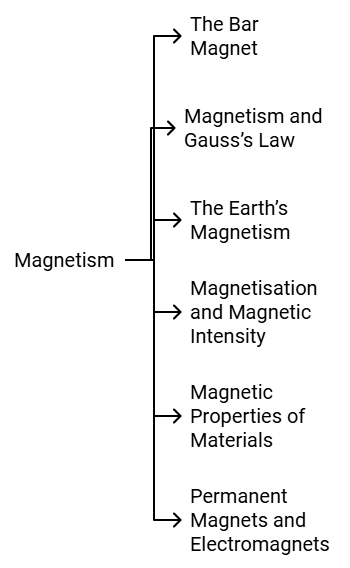
How to Study:
- Start with understanding bar magnets and their properties.
- Learn about magnetization, magnetic intensity, and Gauss's law for magnetism.
- Study the magnetic properties of materials, permanent magnets, and electromagnets.
Tips and Tricks:
- Use mindmaps for quick revision. Mindmaps Physics Class 12
- Explore the behavior of different materials in magnetic fields.
- Solve problems related to magnetic materials and permanent magnets.
Things to Keep in Mind:
- Practice calculating magnetic properties and behaviors of different materials.
- Take a test to assess your understanding of magnetism and materials.
- Attempt Test: Magnetism & Matter.
Day 39-40: Class 12 - Chapter 6: Electromagnetic Induction
Subtopics:
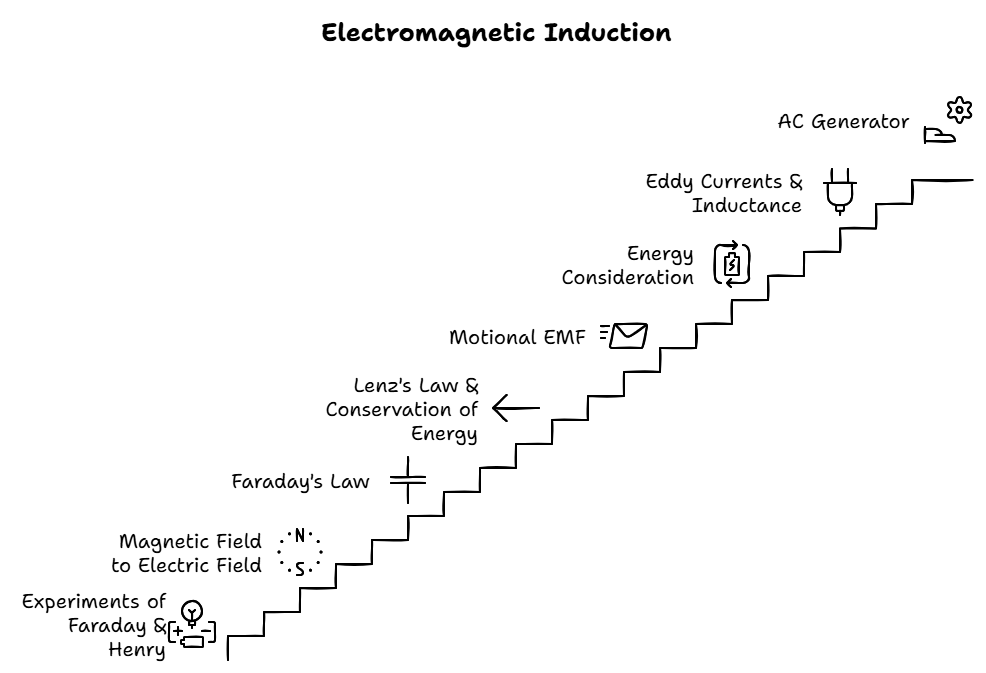
How to Study:
- Begin with understanding Faraday's and Henry's experiments.
- Learn about magnetic field-induced electric fields, Faraday's law, and Lenz's law.
- Study motional electromotive force, energy considerations, inductance, and AC generators.
Tips and Tricks:
- Use mindmaps for quick revision. Mindmaps Physics Class 12
- Perform experiments with electromagnetic induction setups.
- Solve problems involving electromagnetic induction and inductance.
Things to Keep in Mind:
- Practice calculating induced EMF, inductance, and solving problems related to electromagnetic induction.
- Take a test to assess your understanding of electromagnetic induction.
- Attempt Test: Electromagnetic Induction.
Day 41-42: Class 12 - Chapter 7: Alternating Current
Subtopics:
- Introduction
- AC Voltage Applied to a Resistor
- Representation of AC Current and Voltage by Rotating Vectors - Phasors
- AC Voltage Applied to an Inductor
- AC Voltage Applied to a Capacitor
- AC Voltage Applied to a Series L-C-R Circuit
- Power in AC Circuit: The Power Factor
- LC Oscillations
How to Study:
- Start with understanding AC voltage and its application to resistors.
- Learn about phasors, AC voltage with inductors and capacitors, and series L-C-R circuits.
- Study power in AC circuits and LC oscillations.
Tips and Tricks:
- Use mindmaps for quick revision. Mindmaps Physics Class 12
- Set up AC circuits to observe phase differences.
- Solve problems involving AC voltage, impedance, and power factor.
Things to Keep in Mind:
- Practice calculating impedance, power factor, and solving problems related to AC circuits.
- Take a test to assess your understanding of alternating current.
- Attempt Test: Alternating Current.
Day 43-44: Class 12 - Chapter 8: Electromagnetic Waves
Subtopics:
- Introduction
- Displacement Current
- Electromagnetic Waves
- Electromagnetic Spectrum
- Uses of Electromagnetic Waves
How to Study:
- Begin with understanding the concept of displacement current.
- Learn about electromagnetic waves, their properties, and the electromagnetic spectrum.
- Study the various uses of electromagnetic waves.
Tips and Tricks:
- Use mindmaps for quick revision. Mindmaps Physics Class 12
- Explore practical applications of electromagnetic waves.
- Solve problems related to wave properties.
Things to Keep in Mind:
- Practice calculating wave properties and understanding their uses.
- Take a test to assess your understanding of electromagnetic waves.
- Attempt Test: Electromagnetic Waves.
Day 45-46: Class 12 - Chapter 9: Ray Optics and Optical Instruments
Subtopics:
- Introduction
- Reflection of Light by Spherical Mirrors
- Refraction
- Total Internal Reflection
- Refraction at Spherical Surfaces and by Lenses
- Refraction by Prism
- Optical Instruments
- Magnification
- Power of a Lens
How to Study:
- Start with understanding the reflection of light by spherical mirrors.
- Learn about refraction, total internal reflection, and refraction by spherical surfaces and lenses.
- Study optical instruments, magnification, and the power of a lens.
Tips and Tricks:
- Use mindmaps for quick revision. Mindmaps Physics Class 12
- Conduct experiments with mirrors, lenses, and prisms.
- Solve problems involving ray optics and lens formulae.
Things to Keep in Mind:
- Practice calculating focal lengths, magnifications, and solving problems related to ray optics.
- Take a test to assess your understanding of ray optics and optical instruments.
- Attempt Test: Ray Optics & Optical Instruments.
Day 47-48: Class 12 - Chapter 10: Wave Optics
Subtopics:
- Introduction
- Huygens Principle
- Refraction and Reflection of Plane Waves Using Huygens Principle
- Coherent and Incoherent Addition of Waves
- Interference of Light Waves and Young’s Experiment
- Diffraction
- Polarisation
How to Study:
- Begin with understanding Huygens' principle and its applications in wave optics.
- Learn about refraction and reflection using Huygens' principle, coherent and incoherent addition of waves, and interference.
- Study diffraction and polarization.
Tips and Tricks:
- Use mindmaps for quick revision. Mindmaps Physics Class 12
- Perform experiments to observe interference and diffraction patterns.
- Solve problems related to wave optics.
Things to Keep in Mind:
- Practice calculating interference patterns, diffraction angles, and solving problems related to wave optics.
- Take a test to assess your understanding of wave optics.
- Attempt Test: Wave Optics.
Day 49-50: Class 12 - Chapter 11: Dual Nature of Radiation and Matter
Subtopics:
- Introduction
- Electron Emission
- Photoelectric Effect
- Experimental Study of Photoelectric Effect
- Photoelectric Effect and Wave Theory of Light
- Einstein’s Photoelectric Equation: Energy Quantum of Radiation
- Particle Nature of Light: The Photon
- Wave Nature of Matter
- Davisson and Germer Experiment
How to Study:
- Start with understanding electron emission and the photoelectric effect.
- Learn about the experimental study of the photoelectric effect and its relation to the wave theory of light.
- Study Einstein's photoelectric equation, the particle nature of light, and the wave nature of matter.
Tips and Tricks:
- Use mindmaps for quick revision. Mindmaps Physics Class 12
- Explore experiments that demonstrate the dual nature of radiation and matter.
- Solve problems related to photoelectric effect and wave-particle duality.
Things to Keep in Mind:
- Practice calculating photoelectric current, threshold frequencies, and understanding wave-particle duality.
- Take a test to assess your understanding of the dual nature of radiation and matter.
- Attempt Test: Dual Nature of Matter.
Day 51-52: Class 12 - Chapter 12: Atoms
Subtopics:
- Introduction
- Alpha-particle Scattering and Rutherford’s Nuclear Model of Atom
- Atomic Spectra
- Bohr Model of the Hydrogen Atom
- The Line Spectra of the Hydrogen Atom
- De Broglie’s Explanation of Bohr’s Second Postulate of Quantisation of Angular Momentum
- The Davisson and Germer Experiment
How to Study:
- Begin with understanding the alpha-particle scattering and Rutherford's nuclear model of the atom.
- Learn about atomic spectra, the Bohr model of the hydrogen atom, and line spectra.
- Study De Broglie's explanation and the Davisson and Germer experiment.
Tips and Tricks:
- Use mindmaps for quick revision. Mindmaps Physics Class 12
- Explore the history of atomic models and experiments.
- Solve problems related to atomic spectra and Bohr's model.
Things to Keep in Mind:
- Practice calculating energy levels, wavelengths of spectral lines, and understanding atomic models.
- Take a test to assess your understanding of atomic structure.
- Attempt Test: Atoms.
Day 53-54: Class 12 - Chapter 13: Nuclei
Subtopics:
- Introduction
- Atomic Masses and Composition of Nucleus
- Size of the Nucleus
- Mass-energy and Nuclear Binding Energy
- Nuclear Force
- Radioactivity
- Nuclear Energy
How to Study:
- Start with understanding atomic masses, nuclear composition, and the size of the nucleus.
- Learn about mass-energy equivalence, nuclear binding energy, and the nuclear force.
- Study radioactivity and nuclear energy.
Tips and Tricks:
- Use mindmaps for quick revision. Mindmaps Physics Class 12
- Explore the concept of nuclear reactions and their applications.
- Solve problems related to nuclear physics.
Things to Keep in Mind:
- Practice calculating nuclear binding energy, decay rates, and understanding nuclear reactions.
- Take a test to assess your understanding of nuclear physics.
- Attempt Test: Nuclei.
Day 55-56: Class 12 - Chapter 14: Semiconductor Electronics: Materials, Devices and Simple Circuits
Subtopics:
- Introduction
- Classification of Metals, Conductors and Semiconductors
- Intrinsic Semiconductor
- Extrinsic Semiconductor
- p-n Junction
- Semiconductor diode
- Application of Junction Diode as a Rectifier
- Special Purpose p-n Junction Diodes
- Junction Transistor
- Transistor Action
- Transistor as an Amplifier
- Feedback in Amplifiers
- Oscillators
How to Study:
- Begin with understanding the classification of materials into metals, conductors, and semiconductors.
- Learn about intrinsic and extrinsic semiconductors, p-n junctions, and semiconductor diodes.
- Study the application of diodes as rectifiers, special purpose diodes, and transistor behavior.
Tips and Tricks:
- Use mindmaps for quick revision. Mindmaps Physics Class 12
- Build simple electronic circuits to understand diode and transistor behavior.
- Solve problems involving semiconductor electronics.
Things to Keep in Mind:
- Practice circuit analysis involving diodes, transistors, and amplifiers.
- Take a test to assess your understanding of semiconductor electronics.
- Attempt Test: Logic Gates.
Day 57-58: Class 12 - Chapter 15: Communication Systems
Subtopics:
- Introduction
- Elements of a Communication System
- Basic Terminology Used in Electronic Communication Systems
- Bandwidth of Signals
- Bandwidth of Transmission Medium
- Propagation of Electromagnetic Waves
- Modulation and its Necessity
- Amplitude Modulation
- Production of Amplitude Modulated Wave
- Detection of Amplitude Modulated Wave
- Some Advantages of Amplitude Modulation
- Power Dissipation in a Transmitter
How to Study:
- Start with understanding the elements of a communication system and basic terminology.
- Learn about signal bandwidth, transmission medium bandwidth, and electromagnetic wave propagation.
- Study modulation techniques, especially amplitude modulation (AM).
Tips and Tricks:
- Use mindmaps for quick revision. Mindmaps Physics Class 12
- Explore the functioning of AM radio transmitters and receivers.
- Solve problems related to communication systems and modulation.
Things to Keep in Mind:
- Practice calculating bandwidth, modulation indices, and understanding communication system components.
- Take a test to assess your understanding of communication systems.
- Attempt Test: Communication Systems.
Day 59-60: Revision and Practice
- Spend these two days revising all the key concepts and formulas from both Class 11 and Class 12 physics.
- Solve practice questions, sample papers, and previous years' question papers to assess your preparation.
- Identify and focus on any weak areas that need further attention.
Given below are the important links and topic links for your NEET Physics Preparation:
General NEET Resources:
- NEET Exam
- How to Prepare for NEET
- NEET Bible: 7 Steps to Clear NEET by Toppers
- 150 Days NEET Timetable
- How to Prepare for NEET Physics?
- Rapid Revision and Formula Bank for Physics
Class 11 Physics:
- Mindmaps Physics Class 11
- Course Link for Physics Class 11
- DPP for NEET Physics Class 11
- HC Verma Solutions Class 11
- PPT for NEET Physics Class 11
- NCERT Exemplar Physics Class 11
- Chapterwise Previous Year Questions Class 11
- NCERT Textbook & Solutions Class 11
Class 12 Physics:
- Mindmaps Physics Class 12
- Course Link for Physics Class 12
- DPP for NEET Physics Class 12
- HC Verma Solutions Class 12
- PPT for NEET Physics Class 12
- NCERT Exemplar Physics Class 12
- Chapterwise Previous Year Questions Class 12
- NCERT Textbook & Solutions Class 12
Practice and Test Resources:
Class 11 Physics - Chapter Resources:
- Chapter 1: Units and Measurements
- Chapter 2: Motion in a Straight Line
- Chapter 3: Motion in a Plane
- Chapter 4: Laws of Motion
- Chapter 5: Work, Energy, and Power
- Chapter 6: System of Particles and Rotational Motion
- Chapter 7: Gravitation
- Chapter 8: Mechanical Properties of Solids
- Chapter 9: Mechanical Properties of Fluids
- Chapter 10: Thermal Properties of Matter
- Chapter 11: Thermodynamics
- Chapter 12: Kinetic Theory
- Chapter 13: Oscillations
- Chapter 14: Waves
Class 12 Physics - Chapter Resources:
- Chapter 1: Electric Charges and Fields
- Chapter 2: Electrostatic Potential and Capacitance
- Chapter 3: Current Electricity
- Chapter 4: Moving Charges and Magnetism
- Chapter 5: Magnetism and Matter
- Chapter 6: Electromagnetic Induction
- Chapter 7: Alternating Current
- Chapter 8: Electromagnetic Waves
- Chapter 9: Ray Optics and Optical Instruments
- Chapter 10: Wave Optics
- Chapter 11: Dual Nature of Radiation and Matter
- Chapter 12: Atoms
- Chapter 13: Nuclei
- Chapter 14: Semiconductor Electronics: Materials, Devices and Simple
- Chapter 15: Communication Systems
Remember to take short breaks during your study sessions to keep your mind fresh and focused. Additionally, stay hydrated, get enough rest, and maintain a healthy study routine to maximize your productivity.
Good luck with your physics exam..!
|
96 videos|367 docs|98 tests
|
FAQs on 60 Days Timetable for "Physics" NEET Preparation - Physics Class 11
| 1. How should I start preparing for Physics for the NEET exam in 60 days? |  |
| 2. What are the important Physics topics to cover for NEET in 60 days? |  |
| 3. How can I effectively revise Physics concepts before the NEET exam? |  |
| 4. What study materials are recommended for Physics preparation for NEET? |  |
| 5. How can I manage stress during the 60 days of NEET Physics preparation? |  |

















